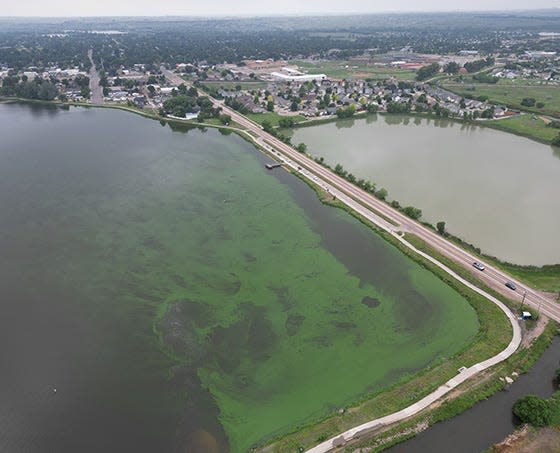It's blue-green algae season again, and Windsor Lake is closed. Here's what to know

Windsor Lake is closed until further notice because there's a chance there's blue-green algae in the water, the town announced Thursday.
A water sample was taken as a precaution and sent to the Colorado Department of Health and Environment for testing, according to a news release from the town of Windsor.
Recreational activities, including tubing and water skiing, are not allowed.
Motorized boat permit holders are allowed on the lake, and nonmotorized boaters can be on the lake at their own risk, but "staying out of the water is highly recommended," the news release stated.
The Colorado health department says when it comes to blue-green algae, remember to keep pets and kids out of the water, shower if you come into contact with the water and do not drink the water.
How does blue-green algae form?
Cyanobacteria is common in lakes in Colorado, the town noted in its news release.
It's brought on by a combination of factors, like sustained hot weather, stagnant water and stormwater runoff that contains fertilizers, grass clippings and other pollutants. Too much nitrogen, potassium and phosphorus in the water can cause algae to grow rapidly, harming water quality, aquatic life and food resources.
What does blue-green algae look like?
These "blooms," which might look like "thick pea soup" or "spilled paint on the water's surface," can become harmful when they produce toxins, according to the Colorado health department.
It can be green, red, gold or turquoise and form a thick mat of foam along a shoreline.
Specks or blobs might be floating at or just below the surface of the water, but the algae is not stringy.
What happens if you come into contact with blue-green algae?
Impacts would vary depending on the level and type of exposure, according to the health department.
Symptoms might include:
skin irritation
gastrointestinal upset
fever
headache
sore throat
muscle and joint pain
liver damage
If you suspect toxic algae is making you sick, contact your health care provider or Poison Control at1-800-222-2222.
What is being done to avoid blue-green algae?
Other than supplementary testing, mapping and using a product to absorb excess phosphorus from moving water, Windsor is piloting a program to combat blue-green algae.
In the Eastman Park Pond floating islands program, islands are made from recycled material and injected with foam to stay afloat. Holes in the islands are filled with native plants that take up excess nutrients that cause blue-green algae. If it proves to work, it could be adopted in other places, the town's news release said.
What you can do to reduce waterway pollution
Avoid over-applying fertilizer and don’t apply it before rain or on windy days.
Use yard waste, grass clippings and fallen leaves as mulch or compost for your garden or bag them in large paper sacks.
Scoop the poop and put pet waste in the trash. Pet waste contains undigested and excess nutrients.
Wash your car so it drains to grass or gravel instead of the street. Soap and grit run along the curb into the storm drain and directly into rivers and lakes. Or go to the car wash. The dirty water at a car wash is discharged to the wastewater sewer system rather than the stormwater system, and treated.
Source: Town of Windsor
Stay up to date on developments
See the status of Windsor Lake at recreationliveshere.com/267/Windsor-Lake-Algae-Advisory.
What to do if you see algae blooms
Stay out of the water.
Don't drink the water.
Keep your pets and livestock away from the water.
Avoid boating near or through algae blooms.
Clean fish well with clean water and properly discard guts.
Source: Colorado Department of Health & Environment
This article originally appeared on Fort Collins Coloradoan: Windsor Lake closed for swimming due to potential for blue-green algae
